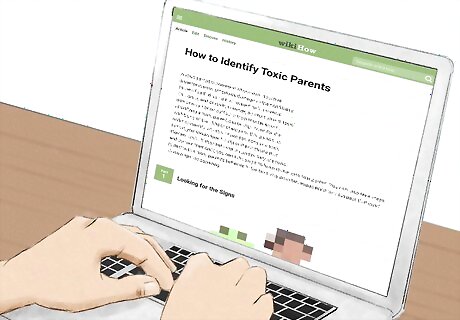
views
Keep an eye out for signs that your mother-in-law is toxic.

There are several red flags to watch out for. It can be hard to accept that your mother-in-law doesn't like you if you haven't done anything wrong. Unfortunately, it's possible that she doesn't like you for reasons completely out of your control. She might be dealing with personal issues of her own, resulting in toxic or hateful behavior. If you're not sure, here are some signs that your mother-in-law might be toxic: She dismisses your point of view She expects you to do everything she wants She badmouths you to other people She holds grudges against you She makes you feel rejected or excluded at family gatherings She is manipulative and plays mind games She's not interested in getting to know you She doubts your intentions or assumes the worst of you She tries to control your behavior or your relationship with her adult child She undermines your authority as a parent
Be kind and avoid stooping to her level.

Matching her hatred may make the situation worse. Though it's tempting to fight back when someone mistreats you, try to be the bigger person in the situation. Be as kind as possible to your mother-in-law, and try your best to be oblivious to her insults or negative comments. You'll end up feeling better about yourself, and it might encourage your mother-in-law to leave you be. Greet her with a smile every time you see her, try to engage in friendly conversations, and avoid reacting if she insults or mistreats you. If she makes a negative comment about your vegetarian diet, for example, avoid getting upset. You might say, "That pot roast you made is tempting, though!" and change the subject.
Set boundaries and stick to them.

Setting boundaries can help you gain control over the situation. Let your mother-in-law know when she has crossed a line, and don't be afraid to kindly, but firmly, stick up for yourself. This can help you establish some ground rules regarding how involved your mother-in-law is in your life, your relationship with your partner, and your parenting decisions. Perhaps your mother-in-law wants to come over multiple times a week, but you're not comfortable with that. You could say, "How about we schedule dinner at our house once a week?" If she presses you to come over more often, simply say, "Our schedule is pretty hectic throughout the week. Once a week would work best for us." Susan Forward Susan Forward, Family Therapist When faced with an antagonistic mother-in-law, the healthiest response is to disengage while maintaining self-respect. Avoid retaliation or appeasement; simply create space. Focus on your spouse and model maturity for any children involved. Though reconciliation may seem unlikely, miracles have been known to happen when firm boundaries are lovingly upheld.
Address the issue with your partner in a gentle manner.

Your partner might be able to give you some help and support. Let your partner know how your mother-in-law's treatment is affecting you in a respectful, non-accusatory manner. To do this, use I-statements and address your mother-in-law's behavior (not her character). This will help your partner become more aware of the issue, and they might end up coming to your defense next time your mother-in-law is out of line. You might say, "When your mom disregards my authority in front of our kids, it makes me feel a little disrespected. I understand that she is their grandmother, but my perspective matters, too." If you need to vent, talk to a friend or trusted family member first. That way, you can let out your feelings without saying anything you might regret. You can also try journaling to express your emotions in private.
Talk to your mother-in-law kindly, but directly.

It might be worth it to ask why she is treating you this way. Before you do this, assess whether you're ready to hear what she might have to say. If you think you can handle it, talk to her privately and ask if she could tell you why she is upset with you. This gives the two of you a chance to connect and air your grievances. It can also help you address any misunderstandings that might be influencing her behavior. You might say, "Last time I came over, you seemed a little frustrated with me. I really would like us to get along, and I was wondering if there was anything that I did that might have upset you?" If she says no or seems unwilling to have a respectful conversation, let the subject go. Getting into a heated exchange might not help the situation, and you're under no obligation to listen to her insult you if that's how she responds. You could invite her to coffee or lunch so you can talk directly.
Limit the time you spend with her if she is mistreating you.

Sometimes, it’s just not feasible to spend time with your mother-in-law. If she is particularly unkind or toxic, it might be best to keep your interactions to a minimum. You can do this by remaining friendly but limiting your interactions to small talk, having a clear start and end time set for your engagements, and even opting out of family gatherings when you're not feeling up to it. You might try sitting at the opposite end of the table as your mother-in-law during family dinners. Say hi and be nice, but spend most of your time talking to other family members. Make concrete plans with a definite start and end time. You might say, "Would you like to come over for lunch from 12:00 pm to 2:00 pm?" If she presses to stay longer, let her know you have other plans later that day. Politely let your mother-in-law know that you have a previous engagement if you can't or don't want to attend a family gathering.
Accept your mother-in-law for who she is.

Let go of trying to change your mother-in-law. As frustrating or confusing as her behavior might be, there may be little you can do to fix the situation. If she's really set in her ways, trying to change her mind and get her to like you might just leave you feeling exhausted and upset. Focus on being the best person you can be on your own terms, and remind yourself that her treatment has little to do with you. You might be tempted to adhere to all of your mother-in-law's wishes and demands so that she will like you. Though it's totally okay to want to please her (you're only human), avoid doing so at the expense of your own mental health.
Empathize with her perspective.

Your mother-in-law's hatred likely has very little to do with you. It's possible that she's jealous or threatened by your presence in her adult child's life. If she blames you for things out of your control, puts her needs above yours, or invalidates you, it's also possible that she's dealing with a mental health issue like Narcissistic Personality Disorder. This is not an excuse for her behavior, but it can help you understand and empathize with her point of view. Next time she insults you for no reason or blames you for something out of your control, think to yourself, "My mother-in-law's behavior has nothing to do with me" or "That hurts to hear, but she is going through a lot of pain right now." It might be helpful to learn more about toxic parents and narcissism to remind yourself that her treatment is not your fault.
Try to emotionally detach from the situation.

You can’t control her behavior, but you can control how it affects you. Anytime your mother-in-law does something to get a rise out of you or hurt your feelings, remind yourself that her treatment is not a reflection of who you are. If you remember this, it may get easier to get through interactions with her without feeling guilty or bad about yourself. Next time your mother-in-law says something rude, you might think, "That's just how my mother-in-law treats people. It is not a reflection of me" or "That wasn't a very nice thing to say, but it has nothing to do with who I am." It might be beneficial to practice mindfulness. This can help you focus on your surroundings and the present moment anytime thoughts about your mother-in-law are distracting or upsetting you.
Take care of your mental health.

This can be an emotionally exhausting situation. Practice self-care by getting plenty of sleep, making time for your hobbies and passions in life, and spending quality time with your support system (your friends, your family, and your partner). All of these activities can give you a relaxing and restorative break from your difficult relationship with your mother-in-law. It can also help you remember all of the good things going on in your life, completely separate from her. Other things that can help you destress include going out for a long walk, any type of exercise, or listening to calming music. You might also try writing down what you're grateful for in life. This can help you focus on the positive when things are tough.
Love yourself no matter what.

Having a difficult mother-in-law can take a toll on your self-esteem. Avoid letting her treatment get you down by reminding yourself of all of your positive qualities, talents, and accomplishments. That way, you'll feel good about yourself no matter what your mother-in-law says or does. Try writing down everything you like about yourself on a piece of paper. Next time you're feeling sad about something your mother-in-law said to you, read over that list. If you're really struggling, you might try talking to a therapist. They can give you some tools to build up your confidence and develop healthy self-esteem. If you're interested, get a referral from your doctor or search online for a therapist in your area.



















Comments
0 comment